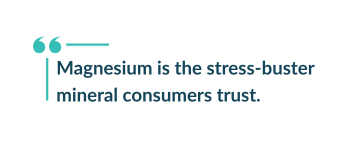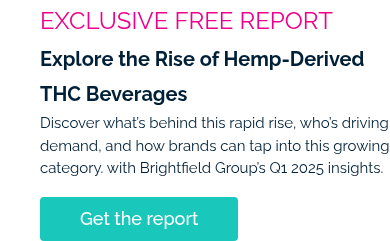Consumers’ Changing Need States
As consumers learn more about the negative effects of alcohol on their health, many are cutting back—or cutting it out entirely. But alcohol has historically played an important role in managing underlying need states: easing social anxiety, lifting mood, and providing stress relief. With that outlet reduced, people are searching for alternative ways to meet those same needs.
Survey data shows that top motivations for decreasing alcohol include saving money, working on mental health, and reducing anxiety. These unmet needs create opportunities for functional ingredients and wellness products to step in to fill the gaps.
Ingredients on the Rise
Q1 2025 social listening data spanning hundreds of thousands of social discussions confirms that certain ingredients are becoming standouts in this context:
- Magnesium is the clear rock star. It holds the largest share of voice (12.4%) and continues to grow steadily (+5.1% actual growth, +54% growth rate). Online conversations highlight its role in stress relief, relaxation, and sleep support. Posts frame it as the “stress-buster” mineral, helping regulate cortisol and promoting calm.

- Probiotics and gut health (6.6% share of voice) link back to mood regulation. The gut-brain axis is a major narrative in social chatter, where probiotics are tied to serotonin production and emotional balance.
- Adaptogens (Ashwagandha, L-theanine, Reishi, etc.) still have a case to be made. They over-index in social mentions for stress and mood regulation, though conversations often carry a note of skepticism—consumers want to believe in the calming power of adaptogens but are wary of “snake oil” claims.
- Electrolytes and hydration boosters are increasingly positioned as mood stabilizers, not just performance enhancers, with a +70% growth rate. The rise of “nervous system nutrition” content emphasizes hydration, minerals, and electrolyte blends as tools for achieving mental balance.
Skepticism and Spending
 Even as interest in functional alternatives to alcohol grows, consumers are weighing the costs against the potential benefits. In Brightfield’s survey data, many who cut back on alcohol cite saving money as a primary motivation. This creates a higher bar for supplements and functional foods: if they carry a premium price tag comparable to or exceeding similar alcohol products yet lack proven efficacy, consumers are likely to ask, “why bother?” —particularly when alcohol delivers immediate, predictable, and familiar effects.
Even as interest in functional alternatives to alcohol grows, consumers are weighing the costs against the potential benefits. In Brightfield’s survey data, many who cut back on alcohol cite saving money as a primary motivation. This creates a higher bar for supplements and functional foods: if they carry a premium price tag comparable to or exceeding similar alcohol products yet lack proven efficacy, consumers are likely to ask, “why bother?” —particularly when alcohol delivers immediate, predictable, and familiar effects.



 Even as interest
Even as interest

